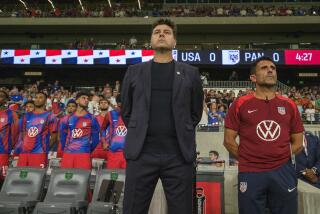Maradona Delivers a World Cup Encore : 57,536 Watch Him Lead Americas Team to Victory at the Rose Bowl
- Share via
Just when it seemed that Diego Maradona’s crown already was beginning to slip, he grabbed it and positioned it firmly back in place.
And that, apparently, was exactly what the crowd of 57,536 at the Rose Bowl had been waiting for Sunday afternoon.
A huge roar arose from the fans as Maradona, who last month led Argentina to its World Cup victory in Mexico, slipped the ball past Soviet goalkeeper Rinat Dasaev to give his team a come-from-behind victory in the second FIFA/UNICEF World All-Star Game.
The final score showed “The Americas”--a team made up of the top players from South, Central and North America--defeating “The Rest of the World,” 4-3 on penalty kicks after the teams had played to a 2-2 tie in regulation.
That the match even went to penalty kicks was due largely to Maradona’s tireless efforts and his inspirational leadership. The heart might easily have gone out of the Americas team once it fell behind, 2-0, on a goal by the old Italian warhorse, Paolo Rossi, in the 59th minute. But, with Maradona leading the way, the Americas fought back.
“In the end, they were in better physical condition,” said Franz Beckenbauer, coach of the World team. “Once you lose condition, you lose concentration.”
That’s what appeared to happen to the World team, which took a 1-0 lead into the locker room at half courtesy of a well-placed header by England’s Terry Butcher off a free kick by Scotland’s Gordon Strachan in the 14th minute.
The World team defense, anchored by Butcher and West Germany’s Uli Stielike in the middle and France’s Manuel Amoros and Belgium’s Michel Renquin on the flanks, was more than a match for the Americas’ attack in the first 45 minutes, and veteran goalkeeper Pat Jennings of Northern Ireland was seldom troubled.
Relying on the counterattack, the World team increased its advantage roughly a quarter of an hour into the second half when Stielike floated a perfect pass to Rossi which the hero of the 1982 World Cup immediately turned into a glorious goal, beating Argentine goalie Neri Pumpido with a shot into the far corner of the net.
“You could see he is still a world-class player,” Beckenbauer said of Rossi, who did not see a minute of playing time in Mexico. “His goal was extraordinary, it was an outstanding goal. He’s still a great player.”
But, while Rossi might play in the same league as Maradona--the Italian First Division--he is no longer in the same league. The Argentine star now shines brighter than anyone in international soccer.
With Maradona here, there and everywhere, the Americas kept pressuring the World defense by throwing four, five and sometimes even six players into the attack. The defense showed signs of cracking and finally did.
The long-awaited goal came in the 81st minute. Paraguayans Roberto Cabanas and Julio Cesar Romero and Brazil’s Roberto Falcao were all involved in a scramble in front of the net and it was Cabanas who managed to get a toe to the ball and poke it past the flailing Dasaev, who had taken over for Jennings at halftime.
That made it 2-1 with less than 10 minutes to play. The momentum had now turned in the Americas’ favor and another goal seemed inevitable. It came with 2:41 remaining in regulation. Dasaev made a diving save off a close-range shot, the ball caromed off his arms and chest and there was Maradona to fire it into the net.
Minutes later, the final whistle sounded and the stage was set for the penalty-kick decider. Ideally, since the game was merely a benefit, it could have ended in a tie and that would have been a fair result. Instead, the spot kicks decided it.
Rossi, Denmark’s Soren Lerby and Strachan scored for the World, but Amoros’ overly casual shot was saved by Paraguay’s Roberto Fernandez, who had replaced Pumpido at the half.
Mexico’s Manuel Negrete took the first penalty for the Americas and watched in agony as Dasaev flung himself to his right to make the save. Falcao, fellow Brazilian Alemao and Cabanas then scored and it was 3-3 when South Korea’s Chang-Sun Park stepped up to take his shot.
Fernandez guessed correctly, dived to his right and smothered Park’s attempt. Up stepped Maradona. He slipped the ball past Dasaev and it was all over, the Americas had won.
Afterward, it was left to Strachan to sum up Maradona’s impact on the match and on the sport as a whole.
“I thought he was magnificent,” Strachan said. “He justified the view that he’s the best player of all right now and one of the best there’s ever been. It was a pleasure for me to be on the same field with him.”
Sitting alongside Strachan in the interview room was UCLA’s Paul Caligiuri, the lone American player in the game. Caligiuri was sent in with 17:09 remaining and took the place of Brazil’s Josimar at right back.
Far from being awed by the occasion, Caligiuri played with confidence, at one point sending a well-weighted crossfield pass to Romero and, later, feeding Maradona with a pass from the right corner to begin the move that ended in Cabanas’ goal.
“It was a tremendous honor for me to be a part of it,” Caligiuri said. “To me, it was the greatest 20 minutes of my life.”
Soccer Notes
Sunday’s match was televised to 68 countries and was seen either live or on tape delay by more than 600 million fans. . . . France’s Michel Platini had been expected to play but bowed out at the last minute, blaming an injury.






